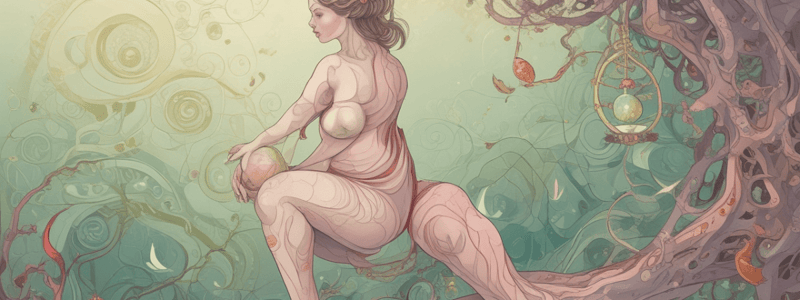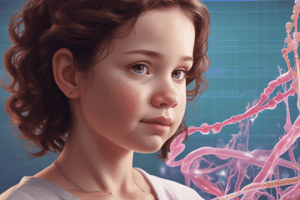Podcast
Questions and Answers
What is the name of the trisomy condition characterized by the presence of all or a part of chromosome 18 in the cells of the body three times?
What is the name of the trisomy condition characterized by the presence of all or a part of chromosome 18 in the cells of the body three times?
- Edward syndrome (correct)
- Down syndrome
- Patau syndrome
- Turner syndrome
What is the term for the condition where clumps of cysts develop within the kidneys?
What is the term for the condition where clumps of cysts develop within the kidneys?
- Klinefelter syndrome
- Polycystic kidney disease (correct)
- Ventricular septal defect
- Trisomy 21
What is a characteristic of Trisomy 21, also known as Down syndrome?
What is a characteristic of Trisomy 21, also known as Down syndrome?
- Mental deficiency
- Prominent occiput
- The Simian line (correct)
- Small testes
What is the name of the syndrome characterized by a male person with an extra X chromosome?
What is the name of the syndrome characterized by a male person with an extra X chromosome?
What is the term for the extra fingers or toes that can occur in some individuals with trisomy?
What is the term for the extra fingers or toes that can occur in some individuals with trisomy?
What is the name of the trisomy condition characterized by the presence of all or a part of chromosome 13 in the cells of the body three times?
What is the name of the trisomy condition characterized by the presence of all or a part of chromosome 13 in the cells of the body three times?
What is the term for the heart defect that can occur in individuals with Trisomy 18?
What is the term for the heart defect that can occur in individuals with Trisomy 18?
What is the characteristic of Klinefelter syndrome?
What is the characteristic of Klinefelter syndrome?
What percentage of liveborn infants have an obvious major congenital anomaly?
What percentage of liveborn infants have an obvious major congenital anomaly?
What is the primary cause of congenital anomalies according to multifactorial inheritance?
What is the primary cause of congenital anomalies according to multifactorial inheritance?
What is the term for a group of anomalies occurring together due to a common cause?
What is the term for a group of anomalies occurring together due to a common cause?
During which period of gestation do malformations typically occur?
During which period of gestation do malformations typically occur?
What is the percentage of Trisomy 21 cases associated with increasing maternal age?
What is the percentage of Trisomy 21 cases associated with increasing maternal age?
What is the term for the upward slant of the eye fissures?
What is the term for the upward slant of the eye fissures?
What is the term for a condition where a part of the fetus is altered due to mechanical forces?
What is the term for a condition where a part of the fetus is altered due to mechanical forces?
What is the term for the crease on the palm of the hand?
What is the term for the crease on the palm of the hand?
What is the result of a vascular accident leading to intestinal atresia?
What is the result of a vascular accident leading to intestinal atresia?
What is the term for a condition where certain pairs of chromosomes get an extra chromosome in every cell?
What is the term for a condition where certain pairs of chromosomes get an extra chromosome in every cell?
What is the term for the bending of the fifth finger towards the fourth finger?
What is the term for the bending of the fifth finger towards the fourth finger?
What is the term for the skin folds at the nape of the neck?
What is the term for the skin folds at the nape of the neck?
What is the percentage of 2-year-olds with congenital anomalies?
What is the percentage of 2-year-olds with congenital anomalies?
What is the term for the unusual flexibility of the joints?
What is the term for the unusual flexibility of the joints?
What is the term for the small size of the jaw?
What is the term for the small size of the jaw?
What is the term for the extra finger or toe?
What is the term for the extra finger or toe?
Which of the following medications may cause fetal harm?
Which of the following medications may cause fetal harm?
What is the primary mechanism by which cocaine may cause birth defects?
What is the primary mechanism by which cocaine may cause birth defects?
Which of the following hormones may cause masculinization of the genitalia of female embryos?
Which of the following hormones may cause masculinization of the genitalia of female embryos?
What is the primary purpose of amniocentesis?
What is the primary purpose of amniocentesis?
Which of the following maternal diseases may cause a variety of malformations in the fetus?
Which of the following maternal diseases may cause a variety of malformations in the fetus?
What is the primary purpose of the triple test during prenatal diagnosis?
What is the primary purpose of the triple test during prenatal diagnosis?
What is the primary risk associated with maternal consumption of heavy metals during pregnancy?
What is the primary risk associated with maternal consumption of heavy metals during pregnancy?
At what gestational age is chorionic villus sampling typically performed?
At what gestational age is chorionic villus sampling typically performed?
What percentage of newborns are born with congenital anomalies?
What percentage of newborns are born with congenital anomalies?
What is the definition of teratogen?
What is the definition of teratogen?
What is the effect of rubella on a fetus?
What is the effect of rubella on a fetus?
What is the mechanism of teratogen?
What is the mechanism of teratogen?
What is the effect of ionizing radiation on a fetus?
What is the effect of ionizing radiation on a fetus?
What is the effect of thalidomide on a fetus?
What is the effect of thalidomide on a fetus?
What is toxoplasmosis?
What is toxoplasmosis?
What is the percentage of males with chromosomal anomalies that have gynecomastia?
What is the percentage of males with chromosomal anomalies that have gynecomastia?
Flashcards are hidden until you start studying
Study Notes
Technique of Amniocentesis and CVS
- Amniocentesis: a prenatal diagnosis technique used to detect chromosomal and metabolic abnormalities, and DNA analysis
- CVS (Chorionic Villus Sampling): a prenatal diagnosis technique used to detect chromosomal abnormalities, similar to amniocentesis
Ultrasound Diagnosis
- Used to detect structural defects in many organs, including:
- CNS (Central Nervous System)
- Heart
- Kidney
- Limbs
- Can detect polydactyly (extra fingers/toes), micrognathia (small jaw), and umbilical hernia (associated with Trisomy 18 in 50% of cases)
Trisomy 21 (Down Syndrome)
- Caused by an extra copy of chromosome 21 (47, +21)
- Frequency increases with increasing maternal age (94%)
- Clinical features include:
- Brachycephaly (short head)
- Up-slanting palpebral fissures (eye openings)
- Epicanthal folds (skin folds at the inner corner of the eyes)
- Brushfield spots (small white spots on the iris)
- Flat nasal bridge
- Folded or dysplastic ears
- Open mouth
- Protruding tongue
- Short neck
- Excessive skin at the nape of the neck
- Transverse palmar crease (single palmar crease)
- Space between the first and second toes
- Hyper flexibility of joints
Neonatal Features of Trisomy 21
- Flat facial profile
- Dysplasia of pelvis
- Anomalous ears
- Excessive skin at the nape of the neck
- Slanted palpebral fissures
- Hypotonia (low muscle tone)
- Hyper flexibility of joints
Congenital Anomalies (Birth Defects)
- Definition: structural abnormalities present at birth
- Causes: genetic, environmental, and multifactorial factors
- Types of abnormalities:
- Malformations: occur during organ formation (e.g. cleft lip and palate)
- Disruptions: result in morphological changes due to exposure to destructive processes (e.g. vascular accidents)
- Deformations: caused by mechanical forces affecting the fetus (e.g. talipes equinovarus)
- Syndromes: groups of anomalies occurring together due to a common cause (e.g. Down Syndrome)
Trisomy
- Definition: a condition where certain pairs of chromosomes get an extra chromosome in every cell
- Most common types of trisomy:
- Trisomy 13 (Patau syndrome)
- Trisomy 18 (Edwards syndrome)
- Trisomy 21 (Down syndrome)
Trisomy 18 (Edwards Syndrome)
- Caused by an extra copy of chromosome 18
- Clinical features include:
- Mental deficiency
- Growth retardation
- Prominent occiput
- Short sternum
- Ventricular septal defect
- Micrognathia
- Low-set malformed ears
- Flexed digits
- Hypoplastic nails
- Rocker-bottom feet
Other Chromosomal Anomalies
- Turner syndrome (45,X): a female missing one X chromosome
- Klinefelter syndrome (47,XXY): a male with an extra X chromosome
- Structural chromosomal anomalies: include chromosomal deletion, duplication, translocation, inversion, and ring and iso chromosomes
Teratogens
- Definition: environmental agents that cause damage to the fetus during the prenatal period
- Examples: viruses, drugs, chemicals, and radiation
- Effect: variation in the development of the embryo, fetus, or child
- Mechanism: the physiological or biological processes that explain the cause or how specific events occur
Environmental Factors
- Infectious agents:
- Viruses (e.g. rubella, cytomegalovirus, herpes simplex, varicella)
- Toxoplasmosis
- Syphilis
- Radiation:
- Ionizing radiation can kill rapidly proliferating cells, producing any type of birth defect
- Chemical agents:
- Thalidomide (produces limb defects and heart malformations)
- Diphenylhydantoin (produces facial defects and mental retardation)
- Tetracycline (produces bone and teeth anomalies)
- Aspirin (may cause harm in large doses)
- Cocaine (may cause birth defects due to its effect as a vasoconstrictor)
- Alcohol (causes fetal alcohol syndrome)
- Hormones:
- Androgenic agents (cause masculinization of the genitalia of female embryos)
- Endocrine hormones (e.g. diethylstilbestrol, cause malformation of the uterus, uterine tubes, upper vagina, and vaginal cancer)
- Insulin (can cause congenital anomalies)
- Cortisone (in large doses, may cause cleft palate)
- Maternal disease:
- Diabetes (can cause variety of malformations, including heart and neural tube defects)
- Nutritional deficiency:
- Vitamin deficiencies (particularly)
- Heavy metals:
- Organic mercury (can cause birth defects)
Studying That Suits You
Use AI to generate personalized quizzes and flashcards to suit your learning preferences.




